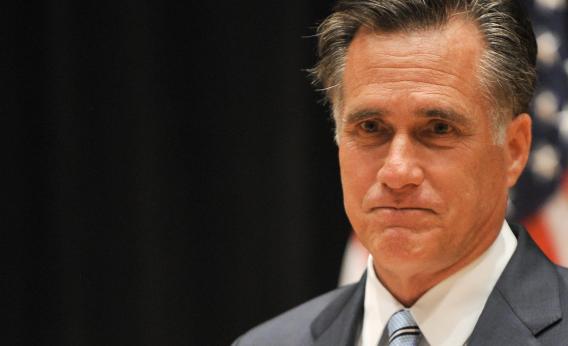Back on Friday, I trudged around the Values Voter Summit in D.C. and asked conservatives why they thought Barack Obama might win. (The polls, then and now, suggest that he’s in the position to do it.) The single most common answer? Well, Obama’s Democrats have been pumping up the ranks of the poor with free goodies, and those saps might be numerous enough to vote for him. They’d been hearing that on talk radio for, well, years. “We have 47, 48 percent who pay no income taxes,” said Rush Limbaugh in July. “We have 3 million more off the unemployment rolls and on the disability rolls, and they all vote!”
Limbaugh’s riff sounds almost exactly like Romney’s. So, I’m not surprised to see many conservative talkers calling on Romney to stand by the comments. Michael Walsh calls it the candidate’s Gettysburg Moment:
What he ought to do is step up and embrace the basic division in our nation, including the fact that nearly half the country pays no income taxes. Acknowledge it — and then explain why, morally, this is not a good thing. Why having no skin in the game while at the same time demanding a say in the proceedings at the federal level is fundamentally undemocratic. One need not embrace the Starship Troopers ethos of Robert A. Heinlein to understand that in a democracy, everyone should pay something — and that to confuse the issue of the (Progressive-era) 16th-amendment-sanctioned federal income taxes with Social Security (“payroll”) levies and state and local taxes is intellectually dishonest.
John O’Sullivan:
He was telling the truth about the most important issue in the election — how Americans are taxed in hidden as well as open ways so that many of them don’t even realize the degree to which they’re being taxed. Then he should have made the rest of his statement a philippic on Obama and the tax issue.
And Rosie Gray has more – CNN’s Erick Erickson, Fox News’s Todd Starnes. All of this came out as Romney defended himself. “This is, of course, something I talk about a good deal in rallies and speeches and so forth,” he said yesterday, “which is the president and I have very different approaches to the future of America and what it takes to ignite our economy and put people back to work. The president believes in what I’ve described as a government centered society where gov’t plays a larger and larger roll, provides for more and more of the needs of individuals and I happen to believe instead in a free enterprise, free individual society where people pursuing their dreams are able to employ one another, build enterprises, build the strongest economy in the world.”
There’s already been a fair deal of lazy commentary comparing Romney’s words to the ones Barack Obama uttered at a San Francisco fundraiser before the 2008 Pennsylvania primary – the stuff about how in bad economic times, “people get bitter, they cling to their guns and religion.” The one commonality between those hidden-tape gaffes is that they inform donors of what they already think about the stupidity of their fellow voters. Any liberal, in 2008, was familiar with Tom Frank’s What’s the Matter With Kansas? thesis about how Republicans suckered poor people into “voting against their interest.” Any conservative, in 2012, is at least familiar with the “lucky ducky” quasi-Marxist theory that people who benefit from government spending will never, ever vote to cut it.
Did Romney’s late night (actually, 7 p.m. local time) presser clean up the story? I think it did so in this way: He did not back down from the comments. He left the impression that his point, about moochers versus makers, was valid. And when Limbaugh warms up the microphone again today, he’ll be reinforcing that message, not tearing chunks out of Romney.
